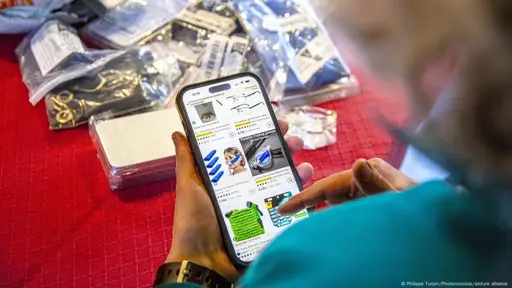US President Donald Trump’s scrapping of a duty-free loophole has shattered Temu and Shein’s business model, choking their flood of cheap Chinese goods into the United States.
[…]
With prices to US consumers more than doubling, these retailers’ profit margins are crumbling. So, Temu and Shein will likely double down on Europe, exploiting the European Union’s de minimis loophole to sustain their low-cost model.
[…]
In 2024, 4.6 billion low-value parcels flooded the EU market — a doubling from 2023 and tripling from 2022, with 91% coming from China.
Those 12.6 million daily packages are delivered duty-free, undercutting European retailers burdened by higher labor, supply chain and compliance costs. Unlike their Chinese rivals, EU firms also don’t benefit from favorable international postal rates.
Although the European Commission proposed scrapping the EU de minimis exemption two years ago, the plan still awaits approval from the 27 EU member states and the European Parliament.
[…]
Chinese goods often fail safety tests
Beyond threatening to dampen profitability and elicit layoffs among EU firms, this influx of cheap goods raises much bigger alarms over product safety.
Agustin Reyna, director general at BEUC, a Brussels-based lobby of European consumer organizations, said groups like his have collected “extensive evidence” of Chinese goods — from toxic makeup and clothing, to faulty toys and appliances — failing EU safety standards.
“We need extra tools to tackle the influx of unsafe products entering Europe via small parcels, often purchased on platforms like Temu,” Reyna told DW. “Consumers are unknowingly putting their health and safety at risk.”
[…]
VAT fraud a growing issue
There’s growing evidence of other illicit practices by Chinese sellers, including underdeclaring the value of the goods to avoid sales or value-added taxes (VAT). These range from 20% to 27%, depending on the EU state.
“There are many cases where importers declare an incorrect value for their consignments to fall below the threshold and avoid customs formalities,” Momchil Antov, an economist and customs expert at the D. A. Tsenov Academy of Economics in Bulgaria, told DW. “This is fraud.”
Last month, the EU’s anti-fraud office OLAF and Polish authorities uncovered a sophisticated VAT fraud scheme involving Chinese goods imported into the EU. Fraudsters claimed the goods were headed for other EU states to avoid tax and customs duties. In reality, the goods mostly stayed in Poland.
In another example, from 2023, Chinese exporters used Belgium’s Liege Airport to evade €303 million in taxes using a complex system involving private customs agencies and fake companies in other EU countries.
[…]
France’s government said last week it would step up inspections on low-value goods entering the country.
The imports will be analyzed for product safety, labeling standards and environmental standards and Paris will charge a flat-rate “management fee” on each parcel.
European policymakers will have to curb fraud, ensure compliance and promote fair competition without limiting consumers’ access to affordable goods from Chinese retailers.
The freight prices need to be changed. It’s unacceptable low.
It’s just not reasonable to get free shipping when buying “dollar store” items from the opposite side of the globe in individual packages. The environment is paying for this shit.
Yes, the environment are paying for that, the low-wage workers in China and/or those working under forced labour-regimes, and the European customers who buy unsafe products threatening their health.
AfaIk, the international pricing is coordinated by the Universal Postal Union, regulating the amount of money e.g. European parcel sevices (DHL, PostNord, …) get when delivering packages from foreign countries. As China currently is treated as developing country, the fees are ridiculously low. Thus, currently, European parcel services “pay” for delivering parcels from China.
There is simply no reason why a package from China should cost less to ship than a package inside of my country. These rules needed to be changed years ago. But here we are.
Definitely.
Cheap chinese copies are getting out of hand at this point, at least for large appliances and furniture the newest trend appears to be making them just well enough that they last a year (To get those genuine good reviews) and then fall apart irreparably. Combine that with a lot of stockers not bothering to seperate the fakes from the originals (Particularly you Amazon) and even buying from a good brand can result in you getting shit anyway.
Ironically its even affecting chinese brands themselves, there are some good ones in the mix but any that break into the western market immediately fall victim to the exact same copycat shit. Trying to replace a dying washing machine right now and its downright scary trying to find one that isn’t a 50/50 lottery of getting what you paid for or getting an appliance sized lump of E-waste.
I don’t use Amazon anymore and have been using eBay for odds and ends, filtering by UK only, but recently I’ve had 2 items delivered from/by Shein. Any ideas what that’s all about?
People drop shipping, perhaps?
all kinds of businesses sell on eBay. I would assume that those companies are no different, just marking it up to cover eBay’s cut, most likely.
How’s that better? Honestly curious.
How are these sites different from AliExpress?
They aren’t





